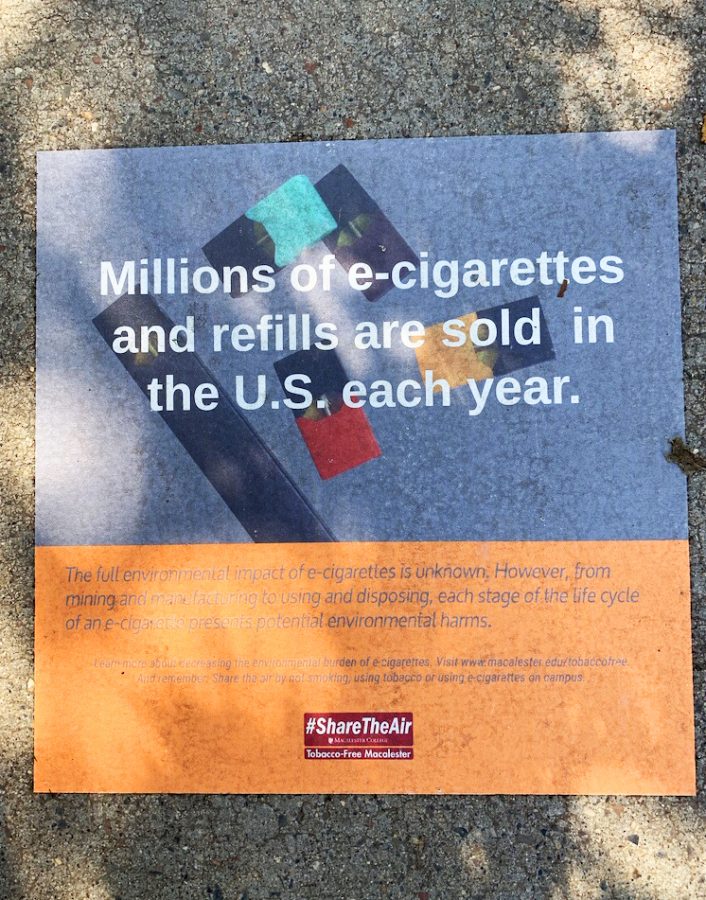Macalester’s tobacco free policy tackles e-cigarettes
Macalester’s tobacco-free campaign lines campus walkways with signs. These and other efforst highlight the environmental impact of e-cigarettes. Photo by Bergen Schmidt ’22.
September 13, 2019
Almost five years ago, on January 1, 2015, Macalester established its tobacco-free policy.
According to Lisa Broek, Macalester’s Director of Health Promotion and leader of Macalester’s tobacco-free movement, the original campaign was informed by a student-conducted study on what factors might motivate students at Macalester to support a tobacco-free policy. Their findings suggested that students were strongly influenced by concern for the environmental impacts of tobacco products.
“What values came out of [the study] were social justice values and environmental health values. [These] were very closely aligned with tobacco-free policies, more so than health issues,” Broek said.
In response, Broek and Macalester’s health promotion team created a campaign with the slogan “Share the Air.”
“We’re all in this together. The air we breathe impacts everyone,” Broek said, emphasizing the environmental focus of their efforts in 2015.
This fall, Broek and Macalester’s health promotion team launched the latest addition to Macalester’s tobacco-free policy. This addition focused on the negative environmental impacts of e-cigarettes.
“It is a very daunting concern within the world that hasn’t gotten a lot of attention,” Broek said.
The campaign examines the environmental degradation produced from what Broek calls “the whole lifespan of the e-cigarette.” This includes the mining of materials, production, use and disposal of e-cigarette products, all of which Broek cites as harming the natural environment and producing e-waste.
Broek believes this appeal to environmental concerns is particularly important among Macalester students.
“Macalester’s very supportive and embracing the idea of environmental health, environmental wellness, sustainability,” Broek said.
“They’ve been a leader in that for decades. And the students, I think, are attracted to Macalester because that’s one of our values.”
The “Share the Air” movement uses education to understand e-cigarettes as more than a personal health issue. The campaign places e-cigarette products at the heart of a global environmental crisis.
“I think knowledge is power,” Broek explained. “Many students don’t recognize the electronic waste associated with e-cigarettes. […] Yes, we know it’s a health issue. But it’s bigger than that.”
For Broek, the tobacco-free campaign faces a population increasingly influenced by tobacco companies, many of which own the major e-cigarette brands as well.
“[E-cigarettes were] seen and pitched from the tobacco industry as a way to quit,” Broek said .
However, the products have become more popular among youth. In Broek’s view, “we’re not talking about a cessation product, we’re talking about an entry into the world of nicotine.”
The tobacco-free campaign has made efforts on campus to promote dialogue about e-cigarettes and their environmental impacts. They have partnered closely with an alumnae Emily Anderson ’03, who works for the Association for Nonsmokers-Minnesota (ANSR), to produce visuals such as mats to line campus sidewalks with messages about e-waste and the global impacts of e-cigarettes.
With grant funds from the Minnesota Department of Health’s Tobacco Free Communities grant program, the campaign has developed individual sets of bamboo utensils and reusable straws which they plan to give to every first-year.
Above all, education about e-cigarettes, from their personal health effects to their environmental impacts, is at the heart of Macalester’s tobacco-free campaign.
“We’re not telling you what to do,” Broek said, “we’re giving you information so that it helps you, students at Macalester, make some decisions for themselves.”













